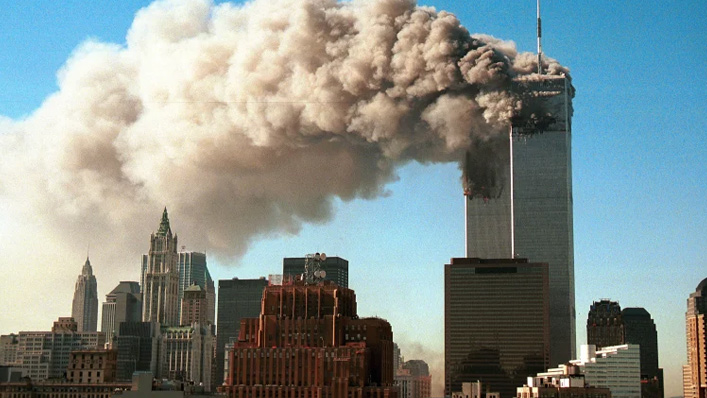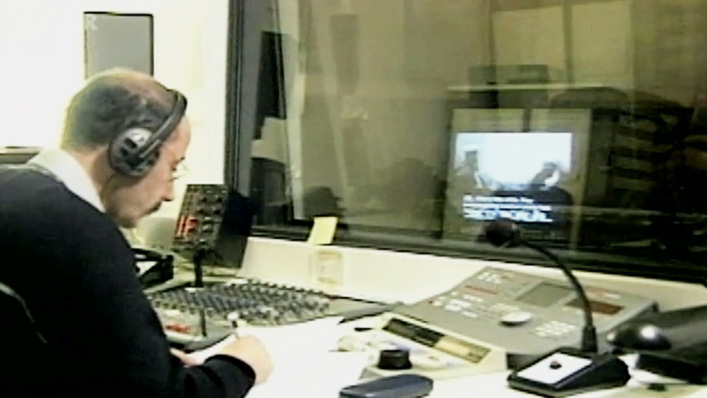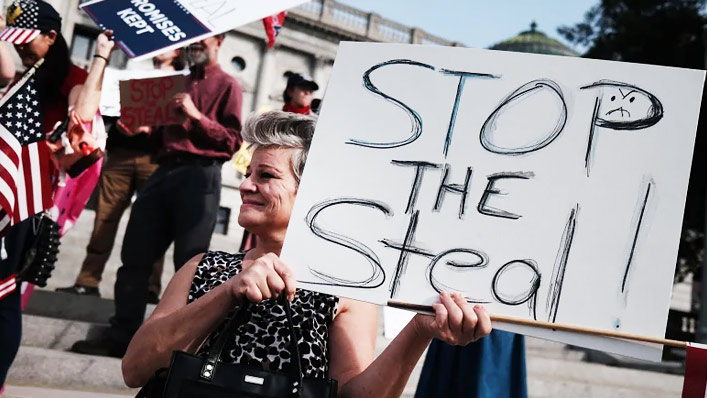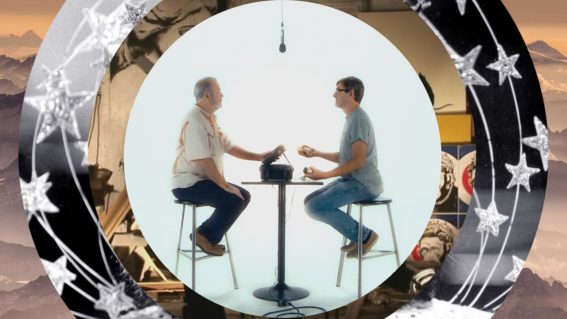Revisiting 9/11 truther doco Loose Change, the granddaddy of modern misinformation

The 9/11 ‘truther’ documentary Loose Change became a milestone production, watched by tens of millions of people. Luke Buckmaster revisits this notorious film in the eerie light of 2021, exploring its unusual and unwanted impact.
The first, most striking thing about watching Loose Change on Stan is that it is even available to watch in the first place. The 20th anniversary of 9/11 has brought a slew of new productions about the watershed event, as well as renewed interest in this famous and highly influential truther documentary, recently described by The New York Times as “the template for the current age of disinformation.” It became a milestone production: a sort of feature-length viral video before the age of viral videos, with an estimated audience (according to its makers) of 100 million.
See also:
* Best new movies & series on Stan
* All new streaming movies & series
It’s surprising to find it part of the Stan catalogue, because, deploying that simple but ever-salient turn of phrase, times have changed (for the record, the film is also available on other platforms including AppleTV and Google Play). Writer/director Dylan Avery’s investigation appears rather sedate these days, when compared to the wild nonsense running rampant such as QAnon, the ‘plandemic’, various mutations of climate denialism and Trump’s so-called ‘stolen election’. The attitude of major media platforms such as Facebook and YouTube has been to clamp down on many of these videos, banishing them to the shadows (or the bowels) of the internet.
Did Loose Change usher us into the post-truth era?
Common wisdom suggests it was Loose Change that let the mad, feral, conspiratorial genie out of the bottle—although surely if it wasn’t this film it would have been another. In the words of Loose Change’s producer Korey Rowe, speaking recently to Associated Press: “Look at where it’s gone. You have people storming the Capitol because they believe the election was a fraud. You have people who won’t get vaccinated and they’re dying in hospitals. We’ve gotten to the point where information is actually killing people.”

The full title of the version streaming on Stan is Loose Change 9/11: An American Coup. Released in 2009, it is one of several recuts, offering a rare kind of film in that it has expanded, contracted and been extensively tweaked with time (George Lucas, eat your heart out!). Over its iterations, speculative points and various elements have been erased from previous versions, while other elements have been added—such as professional graphics and additional interviews. It’s dense, well-paced and vigorously researched—which is not the same as saying its assertions are accurate.
Actor Daniel Sunjata provides the sober-voiced, rational-sounding narration, replacing Avery, who narrated previous versions. Sunjata goes on and on and on, delving into subjects such as timelines, the nature of the blasts that took down the towers, alleged issues with the translation of Osama bin Laden’s confession videos, etcetera etcetera etcetera. The underlying hypothesis is that 9/11 was an inside job, the towers “brought down in a highly engineered, unconventional, controlled demolition” that “was a psychological attack on the American people….pulled off with military precision.”
Conducting your own research sounds like a good idea, but…
The documentary’s claims have been comprehensively debunked, of course, one of the key debunking documents being this illustrated transcript poring over virtually all its assertions. The top of each page of this transcript includes the text: “Which points have value? Which don’t?” These questions treat the reader with respect, asking them to apply their own critical thinking. Which soundslike a good idea, except this same tactic is used by groups such anti-vaxxers and QAnon, which encourage people to ignore experts and conduct their own research.
Why? Because the internet as we all know will inevitably provide material vindicating any view you throw at it—no matter how idiotic or unfactual. The ongoing availability of Loose Change is testament to this melting of truth online, where a decades-old fake news documentary can be watched on a site owned by one of Australia’s leading news publishers.

The film’s continued success is a reminder of how far from the cyber-utopian ideals imagined in the internet’s infancy we have fallen. The proliferation of online content has reinforced views espoused by the French philosopher Jean Baudrillard way back in 1981—that “we live in a world where there is more and more information, and less and less meaning.” This world presents not just a crisis of knowledge but a crisis of morals, exacerbated by factors including modern conservatism in general and Trumpism in particular, a powerful accelerant of the post-truth era.
A world where ‘nothing is true and everything is permitted’
Andrew O’Hehir wrote impressively on this subject in this piece for Salon, including the following sentence which has bounced around in my mind: “In a sense, Trump has done humanity a service, if we are willing to see what he has revealed: We live in a world long prophesied by philosophers and long dreaded by priests, in which nothing is true and everything is permitted—or, to slice it more finely, where truth has been revealed as a relativistic moral construct, which is what it was all along.”
No amount of facts are likely to sway people who adamantly believe Trump’s lie that the US election was stolen; they have their fingers in their ears and have blindfolded themselves. Trying to use facts to convince people who disregard the very idea of a fact brings to mind another quote—this one not from a source as cerebral as a French philosopher, but from Judge Judy: “Don’t try to teach a pig to sing. It doesn’t work, and it annoys the pig.”

So, where is this all heading, in terms of wacky conspiracy theories and streaming platforms? Companies such as Stan, Netflix, and even YouTube will make judgement calls distinguishing conspiracy documentaries they deem more or less harmless (like content about UFOs) or justifiable journalistically, between those that pose dangers and/or public outcry (like anti-vaxxing and climate denialism docos).
When the era of deepfake videos truly arrives, holy hell, things will get more complicated. There’ll be an increasing acceptance of something that is already to some extent true: that we can no longer trust our own eyes and ears. Some political players will fabricate deepfake videos in order to smear opponents, while others will use the existence of deepfakes to claim real footage was faked. The truth, meanwhile, will remain a relativistic moral construct—”which is what it was all along”.
Rubbish conspiracy theories distract us from actual conspiracies
One of the saddest things about people who champion rubbish conspiracy theories is that, by spreading and advocating them, they help disguise conspiracies that actually do exist, lumping together the real with the preposterous. This in turns assists the very conspirators the wingnuts purport to expose. Belief in crazy conspiracies such as QAnon and the ‘plandemic’ obscures factual and demonstrable conspiracies, including collusion between the fossil fuel industry and governments around the world, or the ongoing collusion between Murdoch media and the Coalition in Australia.
Why don’t gungho conspiracy theorists acknowledge these ones? Too true? Too factual? Too plainly visible? Perhaps they derive satisfaction for going against the grain of accepted narratives—while paradoxically implying we could or should believe the least trustworthy of sources. I find this contradiction astonishing: that the same people who squawk about how “all mainstream media is full of lies” are those who take seriously the views of random dudes on YouTube.
One ought to be critical of everything they read and watch—but in the right ways and for the right reasons. Looking back on Loose Change, in the strange and eerie light of 2021, it seems clear the filmmakers inadvertently encouraged many others to do the opposite: to ask the wrong questions for the wrong reasons. What the ‘right’ ones are is not just a complex question, in this frenetic, fractured, and content-saturated world; it’s among the most important of our era.














